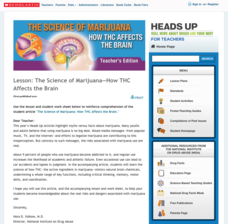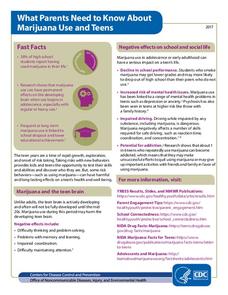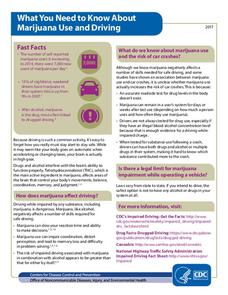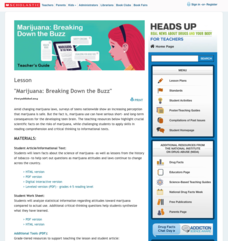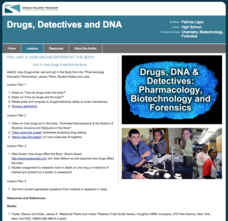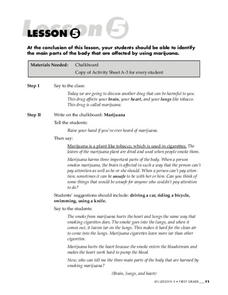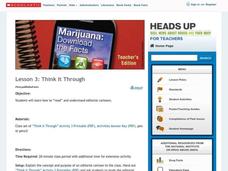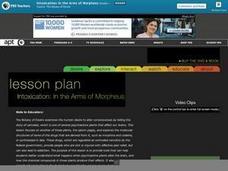Scholastic
Marijuana: Perception of Harm vs. Use
Many teenagers don't believe that marijuana is harmful, but if they do, it affects whether they use it or not. Analyze the relationship between what high school seniors believe about marijuana and their tendency to use it with a reading...
Scholastic
The Science of Marijuana—How THC Affects the Brain
Marijuana can affect every part of a user's life—starting with the delicate nervous centers of the brain. An informative article and worksheet prompt teenagers to learn more about how the THC found in most forms of marijuana can...
Curated OER
Lesson 3 - Marijuana
It's never too early to talk to your young grade schoolers about the dangers of marijuana. Here's a short lesson to discuss some basic information about what happens to the body and the brain when someone smokes marijuana. After the...
National Institute on Drug Abuse
The Brain's Response to Drugs
Marijuana affects the brain differently than inhalants, which have a different effect than opioids. Elementary and middle school classes read about these drugs as well as nicotine, methamphetamine, hallucinogens, and steroids before...
Centers for Disease Control and Prevention
What Parents Need to Know About Marijuana Use and Teens
The teenage years find adolescents yearning for independence—and often isolating their parents from their everyday lives. Educate parents on the warning signs of marijuana use, including its effects on the brain and the likelihood of...
Centers for Disease Control and Prevention
What You Need to Know about Marijuana Use and Driving
Research indicates that marijuana can negatively affect coordination and judgment, making it dangerous to drive while under the influence. But does it increase the risk of car crashes? An informative fact sheet describes the ways...
Scholastic
Marijuana: Breaking Down the Buzz
Teenagers get the real information about marijuana use based on the history of tobacco legislation and research. As they read an educational passage about marijuana laws, science, and changing attitudes, they address their preconceptions...
Scholastic
Marijuana Facts
Can marijuana really hurt you? Three medical facts and three discussion questions prompt teenagers to consider the ramifications of using marijuana recreationally.
Scholastic
Heads Up: Real News About Drugs and Your Body
What's the difference between medical marijuana and marijuana bought on the street? Not much. High schoolers learn more about marijuana with an informational booklet that focuses on the medical uses of THC, how marijuana affects the...
Steered Straight
Marijuana Awareness
February is Marijuana Awareness Month, and a set of interdisciplinary activities can make your class aware of the social, medical, legal, and psychological effects of marijuana. With writing prompts, research opportunities, and...
Scholastic
Marijuana: Breaking Down the Buzz
There are a lot of myths surrounding marijuana. Read a passage that clarifies the dangers of teens smoking marijuana, its harmful effects on the development of the brain, and the possible correlation of cigarette smoking to marijuana...
Curated OER
This Is Your Brain on Pot
Students explore the causes and effects of marijuana addiction and research how THC affects different areas of the brain. They synthesize their knowledge by creating print advertisements that inform teenagers about the physiologic danger...
Kenan Fellows
Unit 3: How Drugs Enter/Exit the Body
The third of a four-part series on Pharmacology teaches scholars how drugs enter and exit the body, how they act inside the body, how they affect the brain, and more. Over the course of the unit, groups complete two labs and one...
Scholastic
Drugs + Your Body—It Isn’t Pretty
Drugs can affect all parts of the body including teeth, skin, heart, brain, and lungs. Use an interactive that explores topics like addiction and the brain, steroid use and skin breakouts, methamphetamine use and rotting teeth, smoking...
Curated OER
Marijuana
Students identify the main parts of the body that are affected by using marijuana.
Scholastic
Consider the Source
Who is more trustworthy when it comes to marijuana: a high school student, or The National Institute on Drug Abuse? Sources matter when reading informational text. Help teenagers discern which facts are true with an activity that focuses...
Scholastic
Think it Through
What does the media tell the teenagers about using marijuana? Help class members decipher what they are being told about drug use with a lesson on editorial cartoons, subliminal messages, and critical thinking skills.
Florida Department of Health
Understanding the Risk of Substance Abuse Unit
Teenage brains are different! Understanding that the teenage brain is still developing and thus more impacted by substance abuse is the key concept in a three-lesson high school health unit. Participants learn about how the brain and...
Curated OER
Intoxication: In the Arms of Morpheus
A comprehensive lesson that takes a look at psychoactive plants with this one focusing on the opium poppy. Information about the history, culture, use, source and effects are discussed. There are weblinks to reliable sources about drugs...
Curated OER
Lesson 12: What Reasonable Conclusions are Possible?
Oftentimes, we jump to conclusions when we are given a limited amount of information. Take a look at reasonable conclusions with your communications studies class. If-clauses, dichotomous thinking, and assumptions are all covered with...
Curated OER
Depression and Cannabis
In this current events worksheet, students read an article about cannabis reducing depression and complete eight true or false questions, 10 synonym matching questions, and a cloze activity based on the article.
Curated OER
Acting Out
Sixth graders investigate peer pressure, gangs, drinking, and using drugs. In small groups, they conduct research, develop, edit, and write a three-minute script, and perform the script for the class.
Curated OER
Cities Crack Down on Raves
Pupils explore personal health issues. In this health journalism lesson, students read the USA Today article titled "Cities Crack Down on Raves", respond to discussion questions regarding the article, and complete an activity based on...
Curated OER
Facts into Action
Learners role play chosen scenario about smart decision making. For this drug awareness lesson, students discuss the danger associated with drug abuse. They practice how to make careful choices when faced with a difficult situation.



